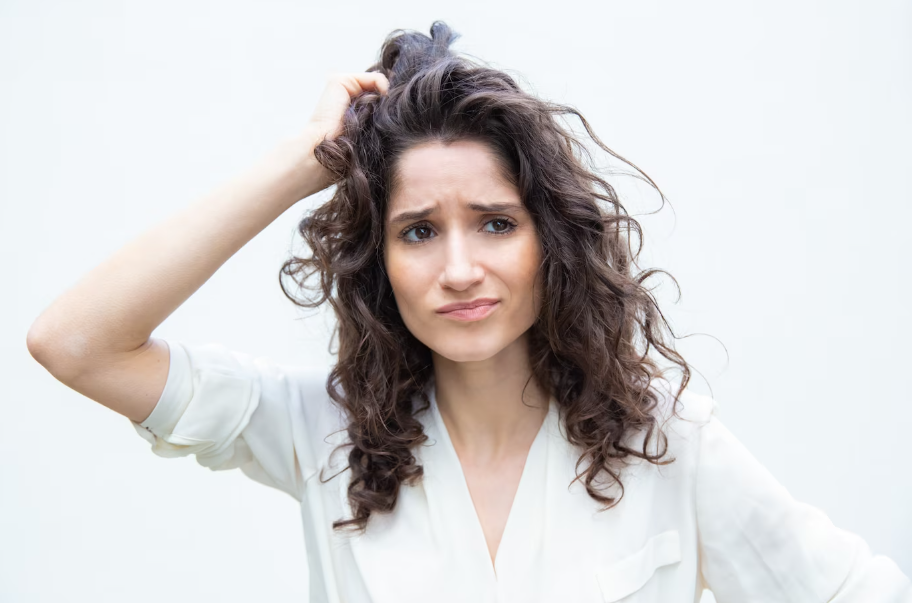A lot of people want their hair to be shiny and healthy, yet for many, having dry hair may be a stressful and difficult issue. When hair is dry, it lacks the natural oils and moisture that are necessary to keep it soft and shiny. In this post, we'll examine the root reasons for dry hair, look at practical remedies, and offer additional advice to make sure your locks stay hydrated and gorgeous.
What Causes Dry Hair?
Natural Hair Type
Some people have a higher propensity for having dry hair because of their natural hair type. It could be harder for people with naturally curly or coarse hair to hold onto moisture.
Excessive Washing
Constant washing can dry out your hair by robbing it of its natural oils. Some hair types may not be able to handle daily shampooing. Choose a sulfate-free, kinder shampoo.
Hot Water
Using hot water to wash your hair might cause the cuticles to open, increasing the likelihood that your hair will become dry. Water that is lukewarm or chilly is preferable.
Chemical Treatments
Regular use of relaxers, perms, and hair dyes can harm the structure of the hair, leaving it dry and brittle.
Heat Styling
Using hair dryers, straighteners, and curling irons too frequently can cause hair to become dehydrated and lose moisture.
Environmental Factors
Being exposed to unfavorable weather, such as stifling winds, the sun, and freezing temperatures, can cause dry hair. Saltwater and swimming pools both contain chlorine, which can be harmful.
Poor Nutrition
Dry, brittle hair can result from a diet deficient in critical nutrients including biotin, vitamins A, C, and E, as well as necessary fatty acids.
Dehydration
When you don't get enough water in your body, your hair may not have the moisture it requires to keep healthy.
Overusing Styling Products
Using too much mousse, gel, or hairspray can build up on your hair, leaving it dry and lifeless and can damage the hair color and texture of hair. To get rid of product residue, make sure to thoroughly clean your hair.
Medical illnesses
Eczema, psoriasis, and hypothyroidism are a few examples of illnesses that can cause dry hair. If you think there may be a health problem lurking beneath the surface, speak with a medical expert.
Medication
Several drugs, such as antihistamines, diuretics, and acne treatments, might have side effects that result in dry hair. With your healthcare practitioner, go over potential substitutes.
Remedies for Dry Hair
Establishing a mild hair care routine that involves shampooing and conditioning your hair as necessary is recommended. Pick hair-specific products and take sulfate-free options into consideration.
Reduce Washing Frequency
To protect your hair's natural oils, wash it less frequently each week. Overwashing can remove necessary moisture. Try to use keratin shampoo it helps to lock moisture into your hair.
Use Lukewarm Water
To protect the hair cuticles when washing your hair, use lukewarm or cool water.
Limit Heat Styling
Use heat styling equipment sparingly, and when you do, use the lowest heat setting and a heat protectant spray.
Avoid chemical treatments
Limit the use of treatments such as perms, and relaxers. Consult a professional stylist if necessary.
Protect your hair
Wear styles that are protective or utilize hats and scarves to protect your hair from the elements when exposed to extreme environmental conditions.
Good Diet
To encourage healthy hair development, eat a balanced diet that is high in vitamins, minerals, and protein. If your diet is deficient in important nutrients, think about taking supplements.
Keep Hydrated
To keep your body and hair hydrated, drink plenty of water. Dry hair issues can be made worse by dehydration.
DIY Hair Masks
Make natural items like honey, yogurt, avocado, or eggs into homemade hair masks. These can provide your hair with great hydration and nourishment.
Select the Correct Brush
To reduce breakage and damage, use a wide-toothed comb or a brush made exclusively for detangling wet hair.
Professional treatments
For more intensive moisture and repair, think about salon treatments like hair masks, hot oil treatments, or keratin treatments.
Avoid Tight Towels
To prevent friction and damage, gently pat your hair dry after washing it rather than excessively rubbing it with a towel.
Extra tips to deal with brittle hair:
Deep Conditioning
Include deep conditioning procedures in your regimen by employing goods that include elements like argan oil, shea butter, or coconut oil. Conditioners that you leave on are also useful.
Regular Trims
To remove split ends and stop future harm, get regular hair trims. This encourages stronger hair growth.
Silk Pillowcase
Using a silk pillowcase while you sleep can lessen friction and help guard against breakage.
Avoid Tight Hairstyles
Tight hairstyles, such as braids and ponytails, can cause dryness and stress on your hair. Whenever feasible, use looser styles.
Natural oils
Use natural oils to hydrate your hair or as a pre-shampoo treatment, such as coconut, jojoba, or almond oil.
Avoid Products With Alcohol in Them
Look for alcohol-based substances on product labels because they might be drying. Choose hair products without alcohol.
Reduce Stress
Prolonged stress can harm the health of your hair. Use stress-reduction methods like yoga, meditation, or deep breathing exercises.
Get Enough Sleep
Sleep has a critical part in the general health and growth of your hair, so make sure you're receiving enough restorative sleep.
Exercise regularly
Being physically active helps the blood flow to your scalp. The improved blood flow may promote stronger hair growth.
Omega-3 Fatty Acids
Include foods high in omega-3 fatty acids in your diet, such as salmon, flaxseeds, and walnuts. These foods can help keep your hair follicles healthy.
Avoid Smoking and Heavy Drinking
Smoking and heavy drinking can harm your hair, so try to cut back or stop these activities.
Gentle Hair Accessories
To reduce friction and hair damage, choose hair accessories made of soft materials. Avoid using tight elastics or clips on your hair that could pull.





Comments